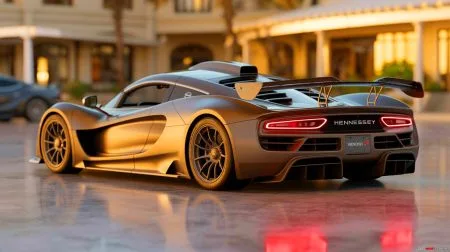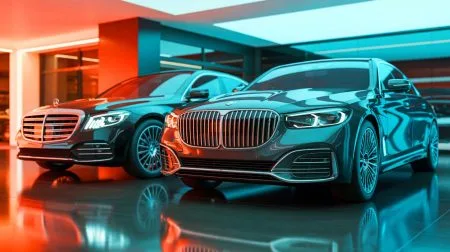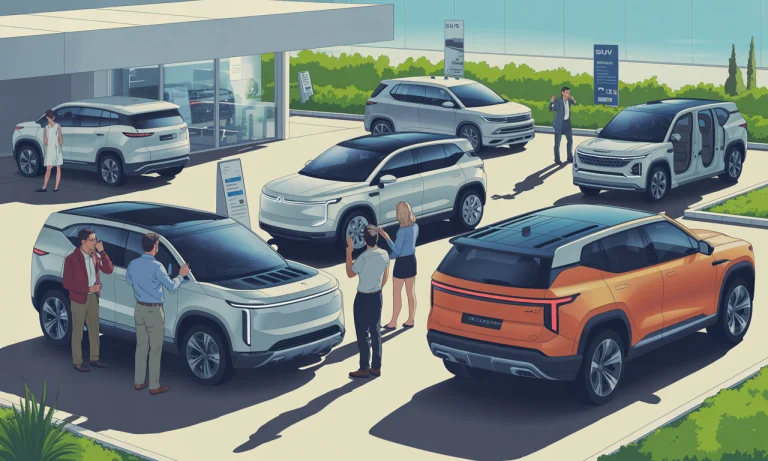There’s a distinctive hum in the air, one that signals both opportunity and change. In 2025, the SUV landscape is unlike anything the market has seen before—more advanced, more nuanced, and more packed with options for buyers who know what they want. But for those stepping onto a dealership lot—or scrolling through endless specs online—the lineup stretches far beyond Toyota, Honda, Ford, Chevrolet, Kia, Hyundai, Nissan, Subaru, Volkswagen, and Mazda. Electric and hybrid revolutions are shaking up old certainties, while new tech and increasing competition mean today’s definitions of efficiency, comfort, and luxury are constantly evolving. One misstep could mean paying too much or driving away in something that doesn’t quite fit your life. As families, commuters, and adventure-seekers all hunt for the perfect ride, it pays to dig deep—learning from experts, recent buyers, and the lessons baked into every fresh model year. If you want to navigate the chaos confidently, start here: understand the big trends, the need-to-know tips, and the pitfalls just waiting to trip up unwary drivers.
Key Factors: Navigating the 2025 SUV Market
Back in the day, buying an SUV usually meant sacrificing either fuel efficiency or the latest tech for raw space and power. Now, as automakers like Toyota and Hyundai double down on hybrid innovations, those choices aren’t so binary. The selection is dizzying, with plug-in hybrids, fully electric models, and gasoline standbys from Ford and Chevrolet sharing the spotlight. What’s changed most isn’t just what’s under the hood; it’s the sheer variety of configurations, price points, and features available in the same footprint. A Mazda on the lot could tempt with an all-electric drivetrain and minimalist luxury, while a Volkswagen may impress with robust connectivity and driver assistance.
The pressure to choose wisely is higher than ever, given how quickly technology and incentives shift from one year to the next. Shoppers frequently find the small details—like battery range on electric SUVs or the subtle distinctions between luxury and mainstream trims—make all the difference in everyday satisfaction. Staying informed means not just visiting showrooms, but staying connected to resources like insider advice on common car-buying mistakes and updated guides to buying new cars in 2025.
Comparing Electric, Hybrid, and Gasoline SUV Options for 2025
When Nora and her partner set out to replace their aging mid-size SUV this spring, the choices were both exciting and overwhelming. Electric models from Kia and Hyundai promised silent, emissions-free commutes, while Subaru and Nissan showed off affordable hybrid crossovers. Key questions loomed: Could an electric SUV offer enough daily range? Would upcoming incentives offset the higher sticker price? For many, there’s comfort in knowing automakers like Ford and Chevrolet continue to refine their gasoline and hybrid vehicles—but failing to weigh all factors, from charging infrastructure to resale value, could mean missing out on future savings or convenience. To keep things simple, it helps to compare SUVs side by side, focusing on what matters most to your lifestyle.
| SUV Segment | Top Performers | Notable Feature | Fuel Type |
|---|---|---|---|
| Compact Plug-in Hybrid | Toyota, Kia, Hyundai | Efficiency + Urban Maneuverability | Hybrid/Plug-in Hybrid |
| Electric Compact | Volkswagen, Mazda, Hyundai | Zero-Emission Range | Electric |
| Midsize Plug-in Hybrid | Ford, Hyundai, Nissan | Family Flexibility | Hybrid/Plug-in Hybrid |
| Full-Size 3-Row | Chevrolet, Honda, Subaru | Space & Power | Gasoline/Hybrid |
| Luxury Electric Midsize | Mazda, Volkswagen | Tech-Driven Comfort | Electric |
Performance, Safety, and Smart Technology: The 2025 SUV Checklist
The definition of “best in class” is rewriting itself each season. Toyota and Honda continue to anchor their vehicles around reliability, but even entrenched brands are embracing advanced safety networks, fueled by AI and persistent connectivity. Consider Subaru’s evolution—a brand once known only for ruggedness now touts advanced drive-assist technology and responsive AWD systems that sense changing terrain. Hyundai, Volkswagen, and Mazda are vying for attention with sleek interiors, robust infotainment systems, and hands-free driving on select models.
For buyers like Omar—trading in a trusty Ford for a tech-infused Hyundai—the checklist extends far past horsepower or seating capacity. Does the SUV include the latest digital displays? What about the suite of semi-autonomous features that make highway miles less taxing? This relentless progression means comparing insurance costs, long-term maintenance, and new technology is as vital as comparing sticker prices. Using resources such as leasing vs. buying breakdowns, 2025’s biggest tech leaps, and insurance calculation guides can guide buyers through these layers of decision-making, bringing clarity to complex choices.
Test Drives, Trade-Ins, and Long-Term Value Strategies
Jenny’s father used to say, “You don’t know a car until you’ve driven it for an afternoon.” In 2025, that advice still rings true, except now the stakes feel higher. Scheduling test drives—especially for new electric or hybrid SUVs from Kia, Mazda, or Chevrolet—means experiencing not only handling, but also how infotainment, safety features, and comfort systems interact in real life. Savvy buyers are also scrutinizing trade-in values and projected maintenance costs. Researching areas like maximizing resale value and maintaining peak performance with smart maintenance habits empowers owners to make decisions that endure beyond their first dealership visit.
| Evaluation Step | Purpose | Go-To Resource |
|---|---|---|
| Test Driving | Hands-on evaluation, feature experience | Test drive checklist |
| Trade-In Analysis | Maximize return, simplify process | Resale insights |
| Maintenance Planning | Ensure reliability, minimize surprises | Maintenance tips |
| Leasing vs. Buying | Optimize costs, align with driving needs | Leasing vs. buying guide |
Electric Incentives, Fuel Efficiency, and the Path Ahead
Government policies are reshaping what makes an SUV a savvy purchase. Buyers in many regions can now access robust incentives for electric vehicles—sometimes tilting the scales heavily away from traditional engines. Brands like Toyota, Kia, and Hyundai are benefiting from these trends, rolling out electric midsize SUVs with competitive range figures, while Nissan and Subaru refine hybrid drivetrains to squeeze maximum efficiency from every drop of fuel. The critical advantage comes from knowing not just what deals are active, but how these align with your own habits—commuters and families will benefit from targeted research, such as up-to-the-minute EV incentives, top-rated fuel savers, and comprehensive electric range guides.
Cultural expectations matter, too. With more SUVs on the road than ever before, the ways drivers think about utility, reliability, and cost have evolved—especially with electric batteries that last longer and hold value, and hybrid maintenance entering a golden era of predictability. If you’re still mapping possible futures, keep a close eye on future EV trends or family-focused electric car reviews, as these will define both dealership inventories and driveway choices for years to come.
Questions drivers ask before taking the leap into SUV ownership in 2025
-
How can I balance electric range with daily needs?
Prioritize electric SUVs with ranges that comfortably exceed your typical weekly route, and consider models known for quick charging—Hyundai and Volkswagen, for example, offer leading-edge battery solutions. Resources like this range guide can help.
-
Are hybrid SUVs less expensive to maintain than gasoline models?
In most scenarios, hybrid SUVs from Toyota and Honda now have comparable or even lower maintenance costs long-term, thanks to fewer scheduled service intervals and improved component durability.
-
What mistakes do buyers commonly make in the 2025 market?
Many drivers rush purchases without assessing incentives, future resale value, or their true technology needs. Avoid these errors by consulting detailed lists like this pitfalls breakdown before committing.
-
Is leasing or buying smarter with new SUVs?
Leasing can suit those keen on always having the latest tech or uncertain about long-term electric vehicle infrastructure, while buying offers more potential for equity and long-term savings. Find deeper analysis at this guide.
-
How can I maximize my SUV’s resale value?
Maintain detailed service records, choose popular brands (especially Toyota, Ford, and Kia), and keep up with recommended maintenance. Strategic upgrades and following resale value best practices can help you cash out strong down the line.
Did you like it? 4.5/5 (21)







